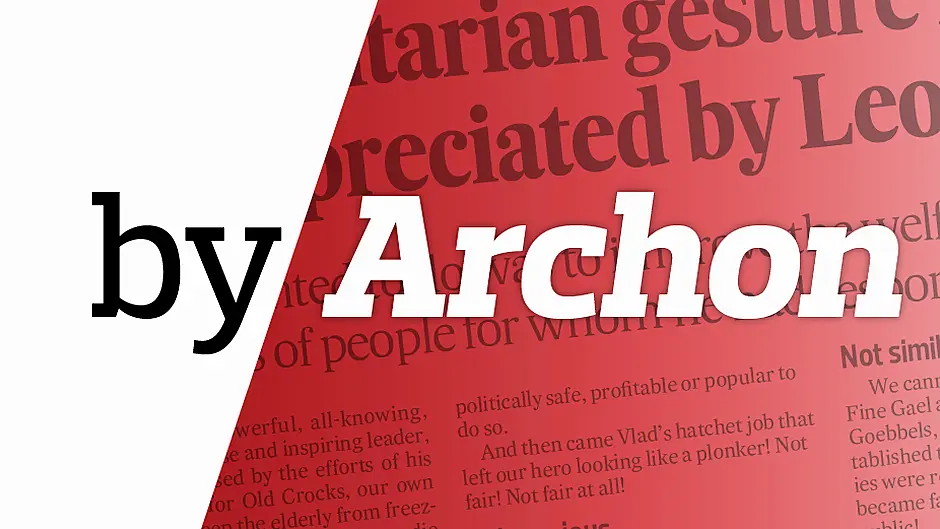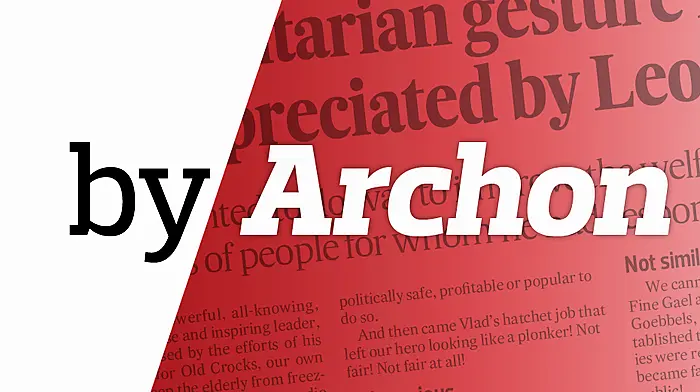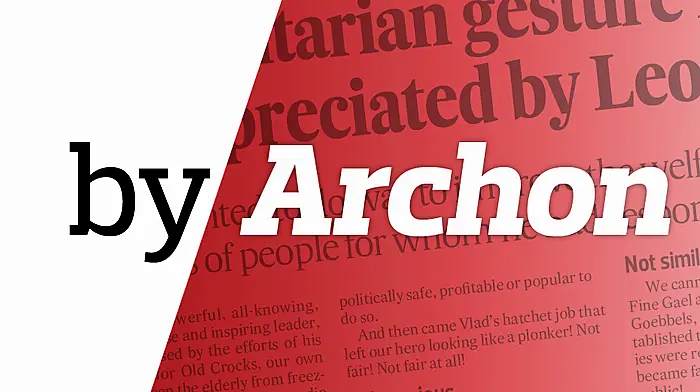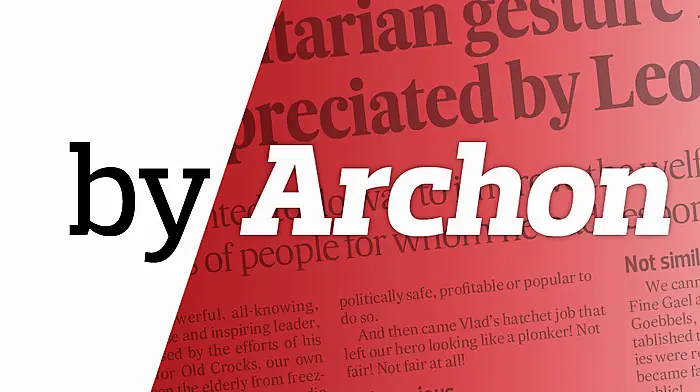Outside of its offensiveness, the sketch didn’t work and failed to elicit even a minimalist chuckle
THE Association of Catholic Priests was quite right to deliver a kick to RTÉ’s metaphorical accoutrements after broadcasting a so-called ‘comedy’ sketch that portrayed God as a rapist!
And it’s not that the priest-group is a bunch of small minded bigots advocating papal policing in matters of faith and discipline. In fact, they’re sort of Leftie!
For instance, they took a neutral stance on ‘gay’ marriage and abortion which led to the inevitable belt of a crozier, and they drew the wrath of Rome for questioning whether Jesus instituted the priesthood.
So, when they declared that RTÉ’s portrayal of God as a dirty old man was over the top and deeply offensive to Christians of all denominations, most of Ireland agreed. What’s more, outside of its offensiveness, the sketch didn’t work and failed to elicit even a minimalist chuckle.
So here’s some advice for RTÉ. Like the cobbler, its funny-men should stick to their last and continue the style of humour with which they’re familiar, such as slipping on banana skins, getting run over by tanks, falling off ladders – things that might provoke a silly giggle or an occasional guffaw.
After all, comedy – no matter how complex, satirical, simple or banal – should have one purpose only: to help people de-emphasise their woes. But the recent RTÉ stuff was conducive to suicidal impulses, prompting this message from the plain people of Ireland: ‘Lads, cut the comedy’!
Best religious joke
Which, of course, does not imply that we want our funnymen to stay away from gags with a religious context or that jokes about religion should be marked by a stern morality. If that happened, mildly amusing contemporary puns (such as abstinence makes the Church grow fondlers) would become a thing of the past.
The best religious joke of all time was invented by American comedian Emo Philips. It’s somewhat long, but worth hanging on for.
It goes like this: ‘Once I saw this guy on a bridge about to jump. I said: “Don’t do it ”. He said: “Nobody loves me!” I said: “God loves you. Do you believe in God?” He said: “Yes.”
‘I said: “Are you a Christian or a Jew?” He said, “A Christian”. I said, “Me too! Protestant or Catholic?” He said: “Protestant.” I said: “Me too! What kind of Protestant?”
‘He said: “Baptist.” I said: “Me, too! Northern Baptist or Southern Baptist?” He said: “Northern Baptist”. I said: “Me, too! Northern Conservative Baptist or Northern Liberal Baptist?”
‘He said: “Northern Conservative Baptist.” I said: “Me too! Northern Conservative Baptist Great Lakes Region or Northern Conservative Baptist Eastern Region?”
‘He said: “Northern Conservative Baptist Great Lakes Region.” I said: “Me too!
‘”Northern Conservative Baptist Great Lakes Region Council of 1879 or Northern Conservative Baptist Great Lakes Region Council of 1912?”
‘He said: “Northern Conservative Baptist Great Lakes Region Council of 1912.”
‘I said: “Die heretic!” And I pushed him off the bridge.’
Precarious position!
Curious too the use of language by that doyen of news diffusion, The Irish Times, and the way it reported the record high number of Covid-19 cases in one week. ‘The State was now in a precarious position,’ it said.
What grabbed our attention was the newspaper’s use of the word ‘precarious.’ After all, if one’s situation is ‘precarious,’ as sure as eggs are eggs you’re not in complete control of things and the world around you – political and economic – is uneasy, unstable and lacking a sense of security!
Which raises this question. Could The Irish Times actually be saying (in code for the Brits, natch) that another wave of Covid-19 will hasten Armageddon, a Gaelic doomsday, and the day of reckoning?
Do the toffs of Tara Street have access to top secret info – namely that a catastrophic attack of Covid-19 will wipe-out of most of the population of Ireland? Otherwise, why would a newspaper that never does hyperbole warn that the nation was now subject to chance and unknown conditions? That we were in ‘a precarious situation’? Scary like!
Hard sums
A recent EU report revealed that Irish students at both primary and secondary level were top Maths performers compared to their equivalents in Europe. The study was based on data gathered across more than 600,000 students in 64 countries and it measured the performance of children at fourth class at Primary level and second year at Secondary Level.
The glad news reminded us of the apocryphal role Mathematics once played in a hurling final (years ago) between UCC and The Rockies.
The story goes that UCC lacked a good full forward and the team was facing defeat without such a player. None could be found until someone thought of a lad from Skibbereen, believed to be a dinger at scoring goals. Unfortunately, he was not a student at UCC or at any Third Level College, and thus was ineligible to play.
But, the UCC gang came up with a devious plan. They would pretend he was a student. The Skibbereen lad agreed, having been warned that if anyone questioned his legitimacy as a UCC student he was to say that he studied Maths Physics.
He played the proverbial blinder and the College won. The Rockies, however, smelled a rat. They wanted to know if this guy really was a UCC student and, if so, what was he studying?
So they approached him and demanded details of his studies. Unfortunately he couldn’t recall the complex term ‘Maths Physics’ or, for that matter, anything remotely related to mathematics.
As he bumbled his way through the interrogation, alerting the Rockies to a possible scam, tempers began to fray. The UCC students knew they were in deep trouble and that the inevitable punch up the throat seemed to be on the horizon.
Fortunately, at the back of the Skibbereen lad’s mind there was something about his imaginary studies having a connection with adding and subtracting. He got a brainwave.
‘I’ll tell you! I’ll tell you what I study!’ he cried to his truculent interrogators.
‘Yeah, well, what do you study?’ the shout went up.
‘It’s … em … ah” He paused, thought deeply and then uttered this profound statement: ‘Hard sums! ... I study hard sums!’
And he got away with it!








